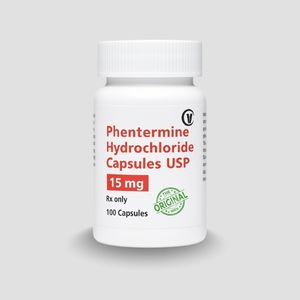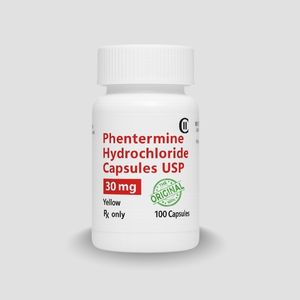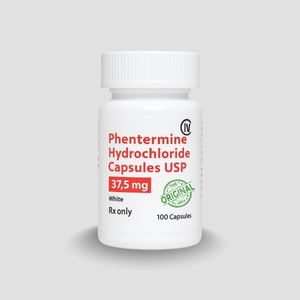Buy Phentermine Online
Showing all 3 results
What is Phentermine?
Phentermine helps stimulate the central nervous system (nerves and brain), which increases your heart rate and blood pressure and decreases your appetite.
Important Information
- Never use phentermine if you are pregnant or breastfeeding a baby.
- Do not use phentermine if you have glaucoma, overactive thyroid, severe heart problems, uncontrolled high blood pressure, advanced coronary artery disease, extreme agitation, or a history of drug abuse.
- Combining MAO inhibitors with this medication may lead to a serious (possibly fatal) drug interaction. During treatment with this medication, do not take MAO inhibitors such as isocarboxazid, linezolid, methylene blue, moclobemide, phenelzine, procarbazine, rasagiline, safinamide, selegiline, tranylcypromine. Do not take MAO inhibitors for two weeks before starting this treatment.
What to know before taking phentermine?
Do not use phentermine if you are allergic to it, or if you have:
- Severe or uncontrolled high blood pressure
- A history of heart disease, including heart rhythm problems, coronary artery disease, congestive heart failure, stroke
- Glaucoma
- Overactive thyroid
- A history of drug abuse
- Extreme agitation or nervousness
- If you also take other diet medicines
Never take this medicine if you have taken MAO inhibitors such as isocarboxazid, linezolid, methylene blue injection, phenelzine, rasagiline, selegiline, or tranylcypromine in the past 14 days. A dangerous drug interaction could occur. Losing weight during pregnancy, even if you are overweight, can be harmful to your unborn child. If you are pregnant, avoid taking phentermine. If you become pregnant while undergoing treatment, notify your doctor right away.
- Do not breastfeed while using phentermine.
- To make sure phentermine is safe for you, tell your doctor if you have.
- A heart valve disorder
- High blood pressure
- Kidney disease
- Heart disease or coronary artery disease
- Diabetes (your diabetes medicine dose may need to be adjusted)
Phentermine is not for use by anyone younger than 16 years old.
How to take phentermine?
- Take phentermine as prescribed by your doctor. Read all medication guides or instruction sheets and follow all directions on your prescription label. Your doctor may adjust your dose from time to time.
- Take the dose before breakfast or 1 to 2 hours after breakfast. Pay close attention to your doctor’s dosing instructions.
- The dose is typically taken once a day before breakfast or at least 10 to 14 hours before bedtime if you take sustained-release capsules. Completely swallow the medication. Do not crush or chew sustained-release capsules. This can cause the entire drug to be released at once, increasing the risk of side effects.
- Never take more phentermine than prescribed or longer than recommended. Taking more of this medication will not improve its effectiveness and may result in severe and life-threatening side effects
- Take phentermine only for a short duration. After a few weeks, the effects of appetite suppression may fade.
- Phentermine can be habit-forming. The misuse of phentermine may lead to addiction, overdose, or death. It is illegal to sell or distribute phentermine. However, you can order phentermine online if you have a prescription for it.
- If you think phentermine is not working as well as it should or if you have not lost at least 4 pounds in four weeks, call your doctor right away.
- If you suddenly stop taking phentermine, you may experience unpleasant withdrawal symptoms. Consult with your doctor about how to safely stop taking this medication.
- Store phentermine at room temperature away from moisture and heat. When not in use, keep the bottle tightly closed.
Phentermine side effects
Common side effects of phentermine may include:
- Dry mouth, unpleasant taste
- Itching
- Diarrhea, constipation, stomach pain
- Dizziness, headache
- Increased or decreased interest in sex
Serious side effects
- Unusual changes in mood or behavior
- Pain in your chest, feeling like you might pass out
- Fluttering in your chest or pounding heartbeats
- Shortness of breath, even with mild exertion
- Swelling in your feet or ankles
- Feeling restless, tremors, trouble sleeping
- Increased blood pressure, symptoms may include blurred vision, pounding in your ears or neck, severe headache, anxiety, nosebleed.



